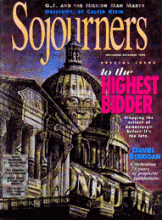Vincent Harding is professor of religion and social transformation at Iliff School of Theology, a
Sojourners contributing editor, and a noted civil rights historian and author. He was interviewed by telephone in late September by Aaron Gallegos.
-The Editors
Sojourners: Many people look at the suffrage movement or civil rights movement and don't see them in the same light as, say, Tiananmen Square or what's going on in Burma or other places of the world. Could you discuss the legacy of democracy movements in this country?
Vincent Harding: We tend to forget that this country developed out of a pro-democracy movement. While the break with England had many complicated aspects to it, one crucial element was the attempt to find a way in which the white, ruling people of this country could establish for themselves a setting where their voice could be the determining voice in the future of the country, rather than the British Crown or the British Parliament or the British representatives of the ruling forces.
And at the very same moment, this country's governing bodies were acting in a most undemocratic, dominating, and destructive way in relationship to many parts of the nation-most obviously with its native peoples, whose lands were being taken and whose lives were being destroyed; its African-American people, who were being used for their labor as a slave people; and with its poorer people generally. None of these three groups had membership in the kind of democracy that this country was claiming to be concerned about and based in.
Therefore, in the midst of this country's overall search for democracy and relationship to its "colonial mother," there was another force demanding that democracy should be manifested within the country itself.
Read the Full Article

